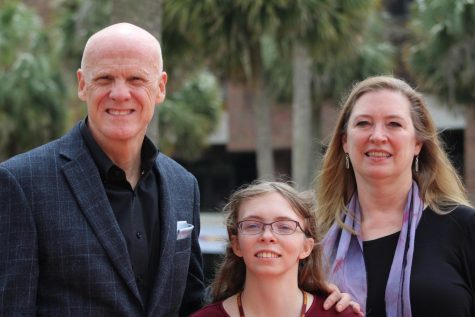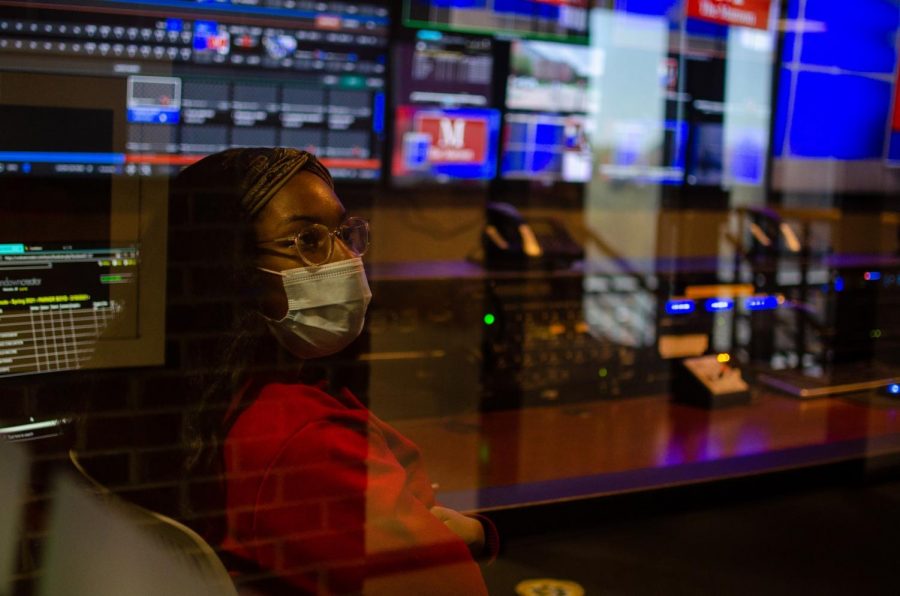New equity and race professor to join School of Communication and Design
Junior Deja Magee helps produce the Maroon Minute broadcast show in Studio A. The School of Communication and Design just endowed a new professorship focusing on diversity and inclusion in media. Photo credit: Gabrielle Korein
March 27, 2021
Loyola’s School of Communication and Design plans to hire a visiting professor to take over the position of a newly endowed professorship that will focus on race and culture in media.
The professorship, titled the “Marion M. and John S. Stokes Jr. Visiting Professorship in Race and Culture in Media,” will host a visiting professor for at least the next three years. The donation for the position came from Stephanie Stokes and Dan Shea, whose daughter Catie studies at Loyola. The donation comes nearly a year after Sonya Duhé, former director of the school, lost a prospective job after leaving Loyola and facing numerous allegations of racism.
The new professorship will focus on students’ development needs in race and equity areas. Lisa Collins, the school’s interim director and an assistant professor, said the position was formed because of students’ needs to prioritize diversity and inclusion. Students told Collins they want to see the faculty better represent the student population.
Collins said the school is now discussing what classes the new professor will teach for the fall. They will teach four classes each semester, possibly an ethics course, or gender and race in media class, according to Collins.
Collins said that donors Stephanie Stokes and Dan Shea wanted to support the school’s ongoing efforts to address issues of equity and inclusion at Loyola and in the broader community.

Stephanie Stokes is a member of the Board of Trustees and her husband Dan Shea is the chairman of Georges Media, which owns The Times-Picayune | The New Orleans Advocate. Their daughter Catie is a visual communications junior within the college.
Stokes and Shea came to New Orleans in 1993 to work as journalists at The Times-Picayune. Shea was a managing editor while Stokes worked as an editor in various departments for 20 years.
“The newsroom there was full of Loyola graduates, and for 20 years we watched a parade of interns from Loyola, many of whom stayed on staff,” Stokes said. “They stood out as hard-working and dedicated to news gathering, and they had a deep love of New Orleans.”
Jade Myers, mass communication senior and chapter president of the National Association of Black Journalists, said that the new professorship is a step into a more diversified and inclusive direction, which she believes will benefit all students in the school.
“A faculty position means a big financial investment on the part of the university and can often take years to come to fruition. But I knew this was important to students, so I looked for other avenues to make it happen,” Collins said.
Collins said Shea and Stokes agreed to fund the position for three years which will help the person in the role put down roots at Loyola.
The professorship is named after Stoke’s late stepmother, Marion Stokes, and father, John S. Stokes.
Stokes said that Marion was active in civil and women’s rights, and she knew that the media shaped perceptions about race and culture.
“We think that supporting diversity and inclusion among future journalists will be good for the media and will contribute to Marion’s legacy, and that of my father, John S. Stokes Jr., who was an activist in his own right,” Stokes said.
Shea said he and the The Advocate | The Times-Picayune have contributed to Loyola already. The Times-Picayune pays for a part-time journalist-in-residence position, now filled by columnist Will Sutton.
“When a new professional is brought into any establishment, they offer a different perspective on topics and issues others may not have much knowledge about or may have difficulty understanding,” Myers said. “I hope students and staff will be open to learning and listening about the guidance and suggestions the new visiting professor may have to offer,” Myers said.
Collins said the school is now discussing what classes the new professor will teach for the fall. The position will teach four classes each semester, possibly an ethics course, or gender and race in media class, according to Collins.
“While we all strive to weave equity and inclusion into our courses, our students will benefit from having one faculty member who is constantly looking at the latest research and best practices for race and equity when it comes to media,” Collins said.
Stokes hopes the new professorship will change the school for the better.
“A substantial percentage of the school’s journalism majors are people of color,” Stokes said. “We hope that this will plant a seed that will grow into a greater focus on diversity and inclusion at the school.”








